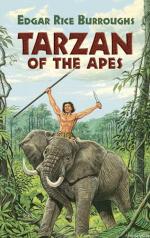|
This section contains 444 words (approx. 2 pages at 300 words per page) |

|
Nearly all of Burroughs's characters are recognizable stereotypes, from the unfortunately comic Negro servants and brutal villains to the supremely beautiful women, good-hearted but weak-willed men, and noble heroes, natives, and even beasts. Tarzan, though, goes beyond stereotype to archetype of the heroic masculine figure. Jane Porter sees a face of "extraordinary beauty, . . . a perfect type of the strongly masculine, unmarred by dissipation, or brutal or degrading passions." The entire Chapter 20, titled "Heredity," stresses Tarzan's perfection. He kisses the locket where her hand had rested in "a stately and gallant little compliment performed with the grace and dignity of utter unconsciousness of self. It was the hallmark of his aristocratic birth, the natural outcropping of many generations of fine breeding, an hereditary instinct of graciousness which a lifetime of uncouth and savage training and environment could not eradicate." Throughout the book and the series, descriptions stress Tarzan's godlike...
|
This section contains 444 words (approx. 2 pages at 300 words per page) |

|




